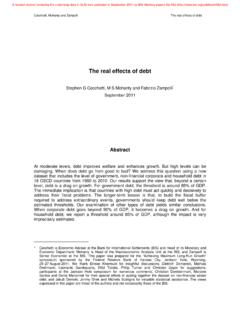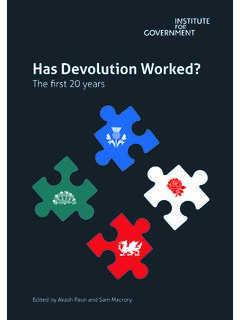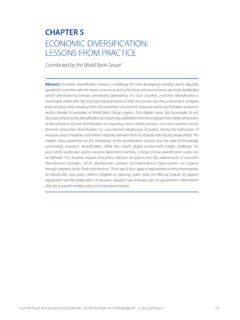Transcription of Future of Skills and Lifelong Learning - GOV.UK
1 1 Future of Skills & Lifelong LearningFUTURE OF Skills AND Lifelong LEARNING3 ContentsExecutive Summary 6 Chapter 1 | Skills and Lifelong Learning : UK Challenges 10 Chapter 2 | Skills and Lifelong Learning : Benefits and Costs 20 Chapter 3 | Low Literacy and Numeracy in the UK 30 Chapter 4 | Improving the Work-Readiness of Labour Market Entrants 42 Chapter 5 | Mismatches between demand for and supply of Skills 56 Chapter 6 | Low Skills Equilibria 72 Chapter 7 | Learning Across the Life Course 82 Acknowledgements 97 Commissioned papers 98 Bibliography 100 Future OF Skills AND Lifelong LEARNINGF orewordImproving our Skills base is critical to increasing prosperity in the UK, as well as delivering considerable benefits to society as a our Skills is not just an aspiration, but with a changing job market is essential.
2 This means not just raising the level of qualifications. It s getting the right mix of abilities, technical knowledge demanded by the workplace and Skills to use those abilities and knowledge. It s about changing attitudes to Learning across our lifetime and realising the positive benefits this report sets out some of the challenges the UK faces if we want to keep benefiting from better Skills . Both literacy and numeracy improvements are needed as well as matching the right Skills with the right jobs. A huge amount has been achieved in a short space of time. Three million high quality apprenticeships will be delivered by 2020. Local communities will be empowered to find approaches that work best for their specific needs.
3 Different approaches through Lifelong Learning pilots will make sure we understand better how to make sure that becomes a reality. It will take time to see this come to fruition but determined and focused joint working will take us to this our Skills right is just one side of the coin. Opportunities to use those Skills is the other. A strong UK economy developing new opportunities guided by the Industrial Strategy will make sure that those building the right Skills will have rewarding jobs. By working together, we will see another RT HON ANNE MILTON MP5 PrefaceWhile the UK currently has one of the highest rates of employment in developed nations, we are entering a period when the age structure of the UK population is changing significantly and global technological advances are disrupting some jobs and occupations while creating this context our Skills for employment will be crucial in improving UK productivity, staying resilient and thriving in an uncertain Future .
4 Moreover, for the individual, better Skills enable freedom of opportunity, provide people with the tools to adapt to a changing world and promote social mobility, inclusion and wellbeing. Changes to Skills policy now will affect people s working lives for the next 50 report focuses on five challenges that, if addressed, would pave the way to a Future where continued Learning would be a new way of life; driving inclusive growth and enabling higher living standards. The evidence we have gathered to understand the implications for Skills and Lifelong Learning policy have already started to filter through government, including DfE and BEIS. However, our findings point towards the need for a concerted effort not only from government, but also employers and this project, we have considered evidence from a wide range of sources, through commissioning working papers and expert meetings, and bringing policy, academia and industry together to develop new ideas.
5 We are grateful to the experts who have been involved. This report brings together the evidence that will help policy makers develop the policies needed to adapt to the increasing need to keep Learning throughout our individuals skill levels can, however, count for little if other parts of the economic fabric of the nation business investment, innovation, and infrastructure do not keep pace. The fact that Skills policy is to be a pillar of the forthcoming UK Industrial Strategy is of great importance in this respect as it will mean that the responses to the five challenges set out in this report can inform, and be informed by, this much wider endeavour.
6 SIR MARK WALPORT & DR TIM LEUNIGFUTURE OF Skills AND Lifelong Learning Executive SummaryFUTURE OF Skills AND Lifelong LEARNINGS kills and knowledge together comprise a nation s human capital on which the economy and society depend. For employers, they are critical for productivity and, for the individual, a significant determinant of wages and UK labour market is in a prolonged period of change. Globalisation has increased competition for UK companies and workers in some sectors and created new markets and opportunities for others. Automation of increasingly sophisticated tasks, particularly using artificial intelligence, could displace many jobs while creating demand for others.
7 Self-employment and the gig economy are increasingly common. At the same time, there are large and persistent regional disparities in economic performance reflecting the asymmetric distribution of Skills across the country. The UK population, while still growing, is ageing, reducing the ratio of workers to retirees so that productivity will need to rise if output and living standards are to be maintained. Those entering the labour market now can expect to work longer and may need to change careers more frequently. Economic security will not come from having a job for life but from having the ability to maintain and renew the right Skills through Lifelong can be acquired through primary, secondary and tertiary education, through training, self-directed Learning and experience of the workplace or everyday life.
8 They include Skills recognised via academic and other qualifications as well as organisational and life Skills . This report reviews the evidence for how well the UK is performing in terms of ensuring that we, individually and collectively, have the Skills needed for the economy and society to thrive now and in the Future . It identifies five important challenges: 7 Young adults in the UK have relatively poor literacy and numeracy and there are signs that we are falling further behind international competitors. Literacy and numeracy are the bedrock on which much else is built. Seven OECD countries have numeracy scores equal to or higher than the UK for all age groups, and the number of countries increases considerably if the UK s high-performing 60-65 age group is excluded.
9 Literacy for UK 16-19 year-olds is ahead of only Chile and Turkey among a group of 24 (mostly OECD) countries. Literacy and numeracy performance varies between UK regions, with London and the South East achieving the highest scores (considered in more detail in Challenge 4). There is also evidence of intergenerational effects, with poor parental attainment reflected in the educational outcomes of the child. Breaking out of this cycle may require interventions that target both the parent and child, for example family Learning programmes. Improvements to literacy and numeracy continue beyond school and higher education into the early years of work, suggesting that workplace environments play an important role in developing these believe labour market entrants are not properly prepared for the workforce; again the UK compares poorly against other countries.
10 Employers are looking not only for better literacy and numeracy, relevant qualifications and/or discipline-specific training but also for more positive attitudes towards work as well as character attributes. Greater collaboration between employers and education providers may help to ensure that education-leavers are equipped with the Skills that are in placements and experience can help individuals gain the non-academic Skills desired by employers. However, only around one-third of employers offer these opportunities and they are predominantly found in the South East of England. Informal Learning also has a part to play, including participation in peer-to-peer Learning or sports and other extra-curricular UK has relatively large mismatches between the supply of and the demand for Skills .


















